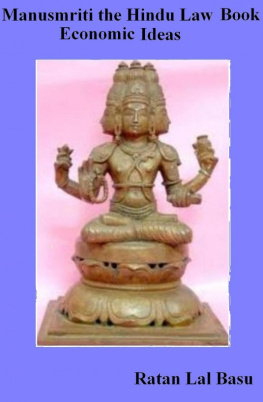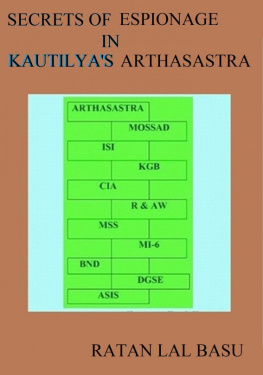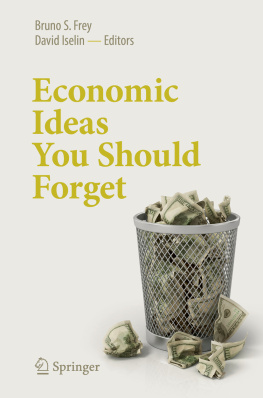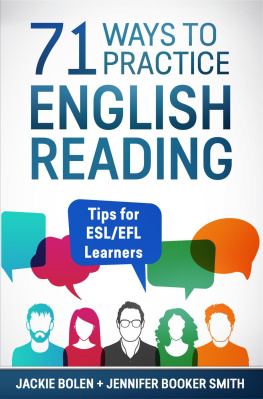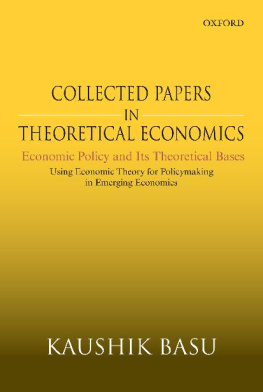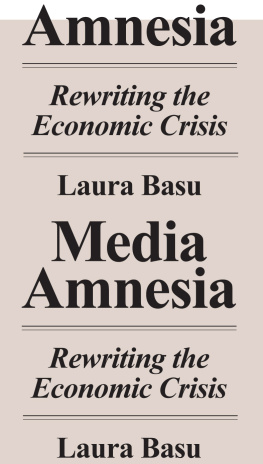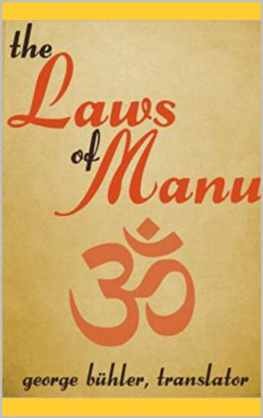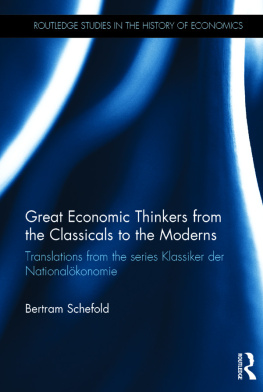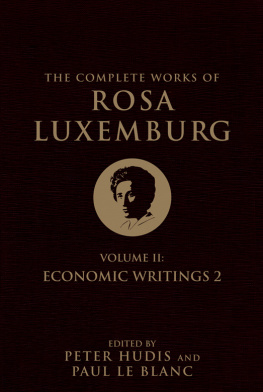Ratan Lal Basu - Manusmriti, The Hindu Law Book: Economic Ideas
Here you can read online Ratan Lal Basu - Manusmriti, The Hindu Law Book: Economic Ideas full text of the book (entire story) in english for free. Download pdf and epub, get meaning, cover and reviews about this ebook. year: 0, publisher: Smashwords Edition, genre: Religion. Description of the work, (preface) as well as reviews are available. Best literature library LitArk.com created for fans of good reading and offers a wide selection of genres:
Romance novel
Science fiction
Adventure
Detective
Science
History
Home and family
Prose
Art
Politics
Computer
Non-fiction
Religion
Business
Children
Humor
Choose a favorite category and find really read worthwhile books. Enjoy immersion in the world of imagination, feel the emotions of the characters or learn something new for yourself, make an fascinating discovery.
- Book:Manusmriti, The Hindu Law Book: Economic Ideas
- Author:
- Publisher:Smashwords Edition
- Genre:
- Year:0
- Rating:5 / 5
- Favourites:Add to favourites
- Your mark:
- 100
- 1
- 2
- 3
- 4
- 5
Manusmriti, The Hindu Law Book: Economic Ideas: summary, description and annotation
We offer to read an annotation, description, summary or preface (depends on what the author of the book "Manusmriti, The Hindu Law Book: Economic Ideas" wrote himself). If you haven't found the necessary information about the book — write in the comments, we will try to find it.
Manusmriti, The Hindu Law Book: Economic Ideas — read online for free the complete book (whole text) full work
Below is the text of the book, divided by pages. System saving the place of the last page read, allows you to conveniently read the book "Manusmriti, The Hindu Law Book: Economic Ideas" online for free, without having to search again every time where you left off. Put a bookmark, and you can go to the page where you finished reading at any time.
Font size:
Interval:
Bookmark:
Manusmriti, the Hindu Law Book: Economic Ideas
Ratan Lal Basu
Copyright 2011 Ratan Lal Basu SmashwordsEdition
Smashwords Edition, License Notes
Thank you for purchasing this e-book. It isthe copyrighted property of the author, and may not be reproduced,copied and distributed for commercial or non- commercial purposes.If you have enjoyed this book, please encourage your friends topurchase the e-book at Smashwords.com, where they can also discoverother works by this author. Thank you for your support
Study ofthis book would give the reader a complete grasp over the economicideas delineated in the Manusmriti composed originally before 3000B.C. by Manu, a mythical sage and the first king of divine originin India. The available earliest text on which this book is basedwas however, composed around 200 A. D. and is likely to be amodified version of the original (revised to suit the requirementsof the time).
To enable free reading the Englishtranslations of the supporting excerpts from the text has beenrelegated to the end of the book under 'notes'. The interestedreader may digress to the notes at anytime he likes to get theideas expressed in this book substantiated by the text. AlthoughAmerican spelling has been used throughout the main book, theBritish spelling in the quotations from the text (under notes) hasbeen kept intact. However, some diacritical marks (in the Englishrendering) which are likely to corrupt the file have beenomitted.
Ratan Lal Basu
21 June, 2011
Among theDharmasastras (law books) in ancient India the text known asManusmriti occupies a very important place because of its widecoverage and detailed guidelines for various aspects of humanliving. The text is surrounded by myths. It is claimed that theoriginal text was composed by Manu, a mythical sage and the firstking of the Hindus. Indologists, on the basis of mentions of thebook in other ancient Indian texts, claim that the originalManusmriti existed even before 3000 B.C. The versions of the textwith commentaries, available at present, were, however, writtenmuch later -- the earliest available version with commentaries byMedhatithi was written around 200 A.D. But even this versioncontains ideas that appear to be of much earlier origin.
To quote:
Many myths have since very early timesclustered round the name of Manu. He is regarded as perfect instudy of the Veda, in the knowledge of its meaning, and theperformance of its precepts. His origin is said to be divine and heis sometimes declared to be even a manifestation or incarnation ofthe Supreme Soul. ---Different Vedic works belonging to differentSchools declare, All that Manu said is medicine, i.e., salutary.He is said to be the fountain head of all the Smritis ortraditional lore and Brihaspati while proclaiming the superiorityof Manu on the score of his strict adherence to the Veda, clearlydeclared that a text opposed to Manu is not commendable ---ThePandits adhere to the above view up to the present time. Thissupreme position of the author justly commanded the unflinchingadherence of the Hindus and made the work exceptionally popular.The completeness of the work, its intelligibility and its orderlyarrangement also contributed to the same result. (Sen, SatyendraNath 1976, Introduction, P. xii-xiii)
On the basis of evidence from ancient Indiantexts the author of the present Manusmriti flourished at leastbefore 3000 B.C. (Ibid. Introduction, P. xvi). The originalManusmriti was written and revised several times later on to takeaccount of the current problems of different ages. The originalManava Dharmasastra is likely to be different from the work whichnow goes by the name of Manu. It is clear from the fact that someof the slokas, attributed to Manu by Vasistha and others, are notto be found in the present text. (Ibid. Introduction, P. ix)
According to some authors, The Manusmritihad probably attained its present form by the 2nd century A.D. Wefind that though the smriti had begun at an early date and weresupposed to have been based upon Vedic injunctions and customs, yetnew smriti authorities sprang up giving new injunctions which canhardly be traced to Vedic authorities. Many of the olderauthorities were again revised to harmonize the changes made andthese revised editions passed off as the old ones as there were nocritical apparatus of research for distinguishing the new from theold. [Dasgupta & De (eds.), 1962, Introduction, P. xxvi]
There are also many Vasyas (commentaries) onManusmriti. The most popular available Vasyas are of Medhatithi,Kulluka Bhatta, Govindaraja, Sarvajna-Narayana, Raghavananda,Nandana, Ramachandra and Gangadhara. They reflect the transition inthe methods interpreting the text in accordance with the changes invalues and requirements with changes in time.
The ecological principles of Manusmriti arebased on the basic ideal of the Upanisadas, "Vasudhaivakutumbakam, i.e., all the beings of the entire universe belong tothe same family. By means of defining cosmology, Manu hereendeavors to spell out the basic sources of interrelationship amongall beings in this universe. Manu describes how all the material(and perishable) things (living beings as well as lifeless matters)of the world have been originated from the same five elements orPancha-bhutas [Khiti (Earth), Ap (Water), Teza (Fire), Marut (Air)and Byom (Sky)]. [1]
Manu opines that all material things aretransitory and get reduced to the basic elements. But only thecreator is imperishable and permanent. All the material things arecreated and destroyed and this cycle of creation and destruction bythe creator goes on for eternity. [2]
In this way Manu goes in depth into thereason why we should try to conform to the harmony of the wholeuniverse ordained by the creator. So, ecological awareness in Manuis not at all ad hoc and related to some limited self-preservingrequirements of the human race. The specific guidelines prescribedby Manu on the basis of the above realization are discussedbelow.
Manu provides guidelines for harmoniousliving with the orderly universe. In this regard Manu prescribesvarious rites to get rid of the sin committed to nature and itsuniversal ecology. Here he looks upon all these matters from moraland religious standards. [3]
Besides these religious way of conformingwith the ethical requirements of harmonious living, Manu alsoprescribes rules directly connected with day-to-day activities ofdifferent classes of people. But here Manu does not like to usecoercive power of law or the state. He simply endeavors to makepeople behave properly and harmoniously by moral suasion and fearof being punished by the laws of the creator. These were likely tohave a stronger and more sustainable effect than that achieved bylegal restrictions one may evade the eyes of law but not that ofthe creator. The most prestigious caste is the Brahmin and for himit is an urgent necessity (as others are to learn from him) to liveby means which perpetrates the least possible harm to others. Thismay be exempted only when he is in distress. [4]
Manu tries to prevent people from voidingurine in places other than the urinals (or any appropriate placespecified for that purpose) by publicizing the warning thatcommitting such a sin would lead to destruction of themiscreant. [5]
Manu urges people not to pollute water bythrowing polluting and noxious substances into it. He also providesguidelines to make people follow proper way of maintenance ofcleanliness in the day-to-day household life. [6]
Manu is keenly aware of the necessity ofmaintenance of bio-diversity as he considers that man and otherliving beings belong to the same family created by the supremesoul. To prevent unnecessary killing of animals, Manu opines thatmeat-eating should be restricted to only specific purposes. Hementions the specific occasions when meat eating could bepermitted. He also suggests some alternatives means to fulfill bysimulation the strong desire for meat. Manu tries to dissuadepeople from destroying or inflicting harm on other living beings bymeans of generating fear of extra-mundane punishment. In those daysthis was a very effective method of preventing people fromresorting to eco-destroying activities. Even today, religiousprohibition to make people eschew harmful food items is moreeffective than hygienic advices. Manu describes the religiousconsequences of killing, destroying or injuring various types ofliving beings. This was intended to preservebio-diversity. [7]
Next pageFont size:
Interval:
Bookmark:
Similar books «Manusmriti, The Hindu Law Book: Economic Ideas»
Look at similar books to Manusmriti, The Hindu Law Book: Economic Ideas. We have selected literature similar in name and meaning in the hope of providing readers with more options to find new, interesting, not yet read works.
Discussion, reviews of the book Manusmriti, The Hindu Law Book: Economic Ideas and just readers' own opinions. Leave your comments, write what you think about the work, its meaning or the main characters. Specify what exactly you liked and what you didn't like, and why you think so.

